gas type TOYOTA tC 2011 Owners Manual (in English)
[x] Cancel search | Manufacturer: TOYOTA, Model Year: 2011, Model line: tC, Model: TOYOTA tC 2011Pages: 473, PDF Size: 10.91 MB
Page 94 of 473
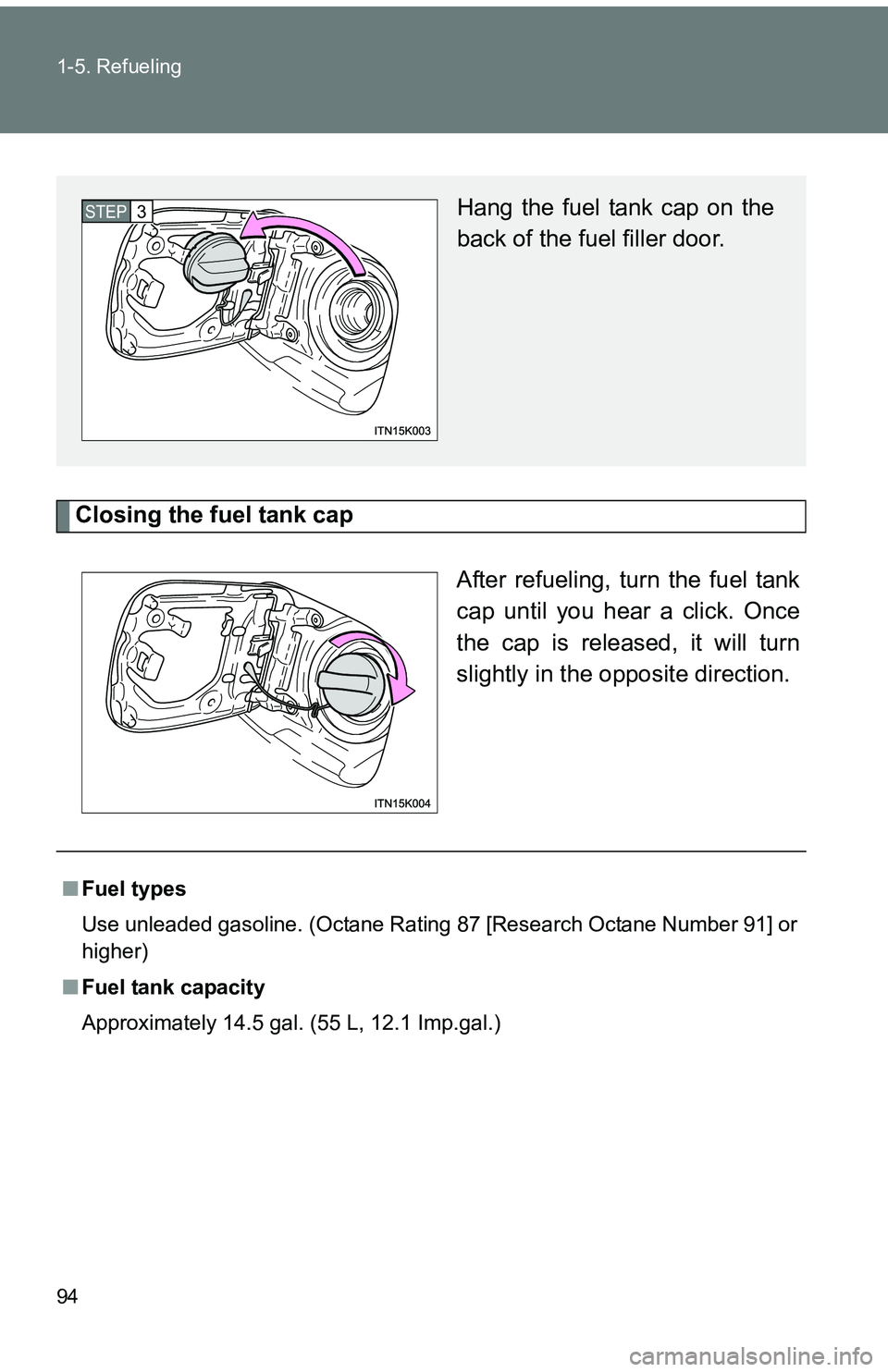
94 1-5. Refueling
Closing the fuel tank capAfter refueling, turn the fuel tank
cap until you hear a click. Once
the cap is released, it will turn
slightly in the opposite direction.
Hang the fuel tank cap on the
back of the fuel filler door.STEP 3
■Fuel types
Use unleaded gasoline. (Octane Rating 87 [Research Octane Number 91] or
higher)
■ Fuel tank capacity
Approximately 14.5 gal. (55 L, 12.1 Imp.gal.)
Page 106 of 473
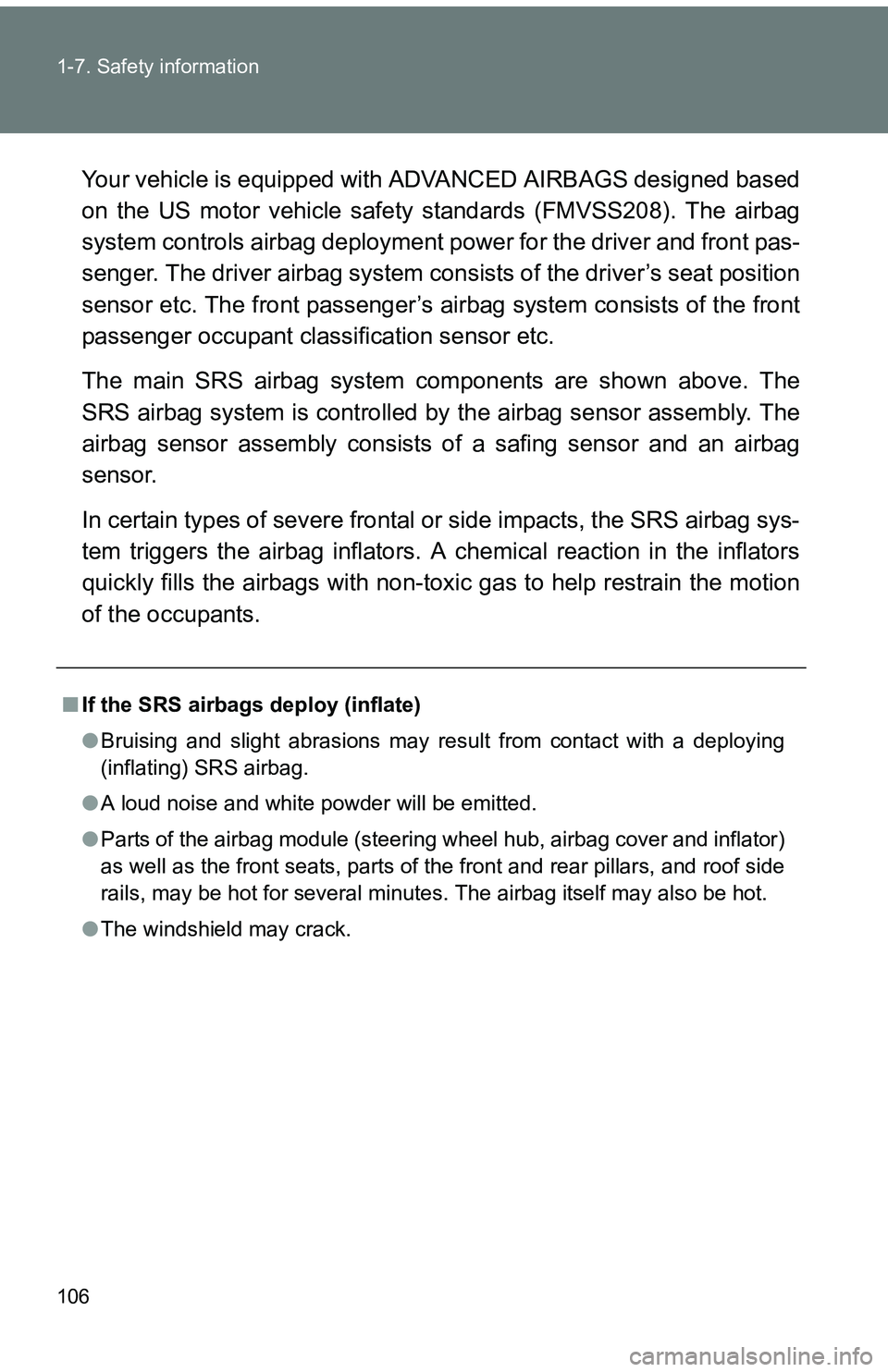
106 1-7. Safety information
Your vehicle is equipped with ADVANCED AIRBAGS designed based
on the US motor vehicle safety standards (FMVSS208). The airbag
system controls airbag deployment power for the driver and front pas-
senger. The driver airbag system cons ists of the driver’s seat position
sensor etc. The front passenger’s airbag system consists of the front
passenger occupant classification sensor etc.
The main SRS airbag system components are shown above. The
SRS airbag system is controlled by the airbag sensor assembly. The
airbag sensor assembly consists of a safing sensor and an airbag
sensor.
In certain types of severe frontal or side impacts, the SRS airbag sys-
tem triggers the airbag inflators. A chemical reaction in the inflators
quickly fills the airbags with non-toxic gas to help restrain the motion
of the occupants.
■ If the SRS airbags deploy (inflate)
●Bruising and slight abrasions may result from contact with a deploying
(inflating) SRS airbag.
● A loud noise and white powder will be emitted.
● Parts of the airbag module (steering wheel hub, airbag cover and inflator)
as well as the front seats, parts of the front and rear pillars, and roof side
rails, may be hot for several minutes. The airbag itself may also be hot.
● The windshield may crack.
Page 268 of 473
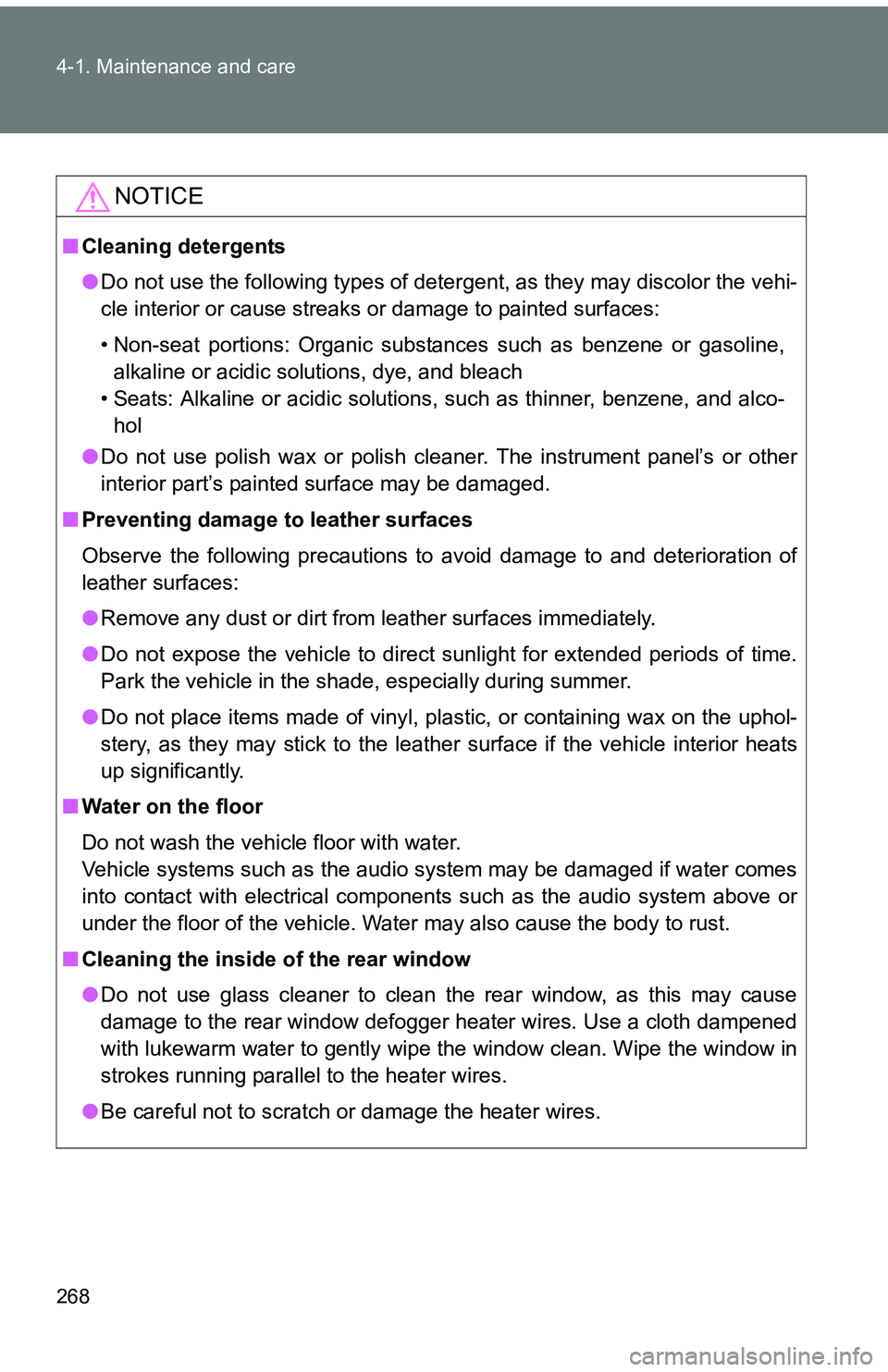
268 4-1. Maintenance and care
NOTICE
■Cleaning detergents
●Do not use the following types of detergent, as they may discolor the vehi-
cle interior or cause streaks or damage to painted surfaces:
• Non-seat portions: Organic substances such as benzene or gasoline,
alkaline or acidic solutions, dye, and bleach
• Seats: Alkaline or acidic solutions, such as thinner, benzene, and alco- hol
● Do not use polish wax or polish cleaner. The instrument panel’s or other
interior part’s painted surface may be damaged.
■ Preventing damage to leather surfaces
Observe the following precautions to avoid damage to and deterioration o\
f
leather surfaces:
●Remove any dust or dirt from leather surfaces immediately.
● Do not expose the vehicle to direct sunlight for extended periods of time.
Park the vehicle in the shade, especially during summer.
● Do not place items made of vinyl, plastic, or containing wax on the uphol-
stery, as they may stick to the leather surface if the vehicle interior heats
up significantly.
■ Water on the floor
Do not wash the vehicle floor with water.
Vehicle systems such as the audio system may be damaged if water comes
into contact with electrical components such as the audio system above or
under the floor of the vehicle. Water may also cause the body to rust.
■ Cleaning the inside of the rear window
●Do not use glass cleaner to clean the rear window, as this may cause
damage to the rear window defogger heater wires. Use a cloth dampened
with lukewarm water to gently wipe the window clean. Wipe the window in
strokes running parallel to the heater wires.
● Be careful not to scratch or damage the heater wires.
Page 413 of 473
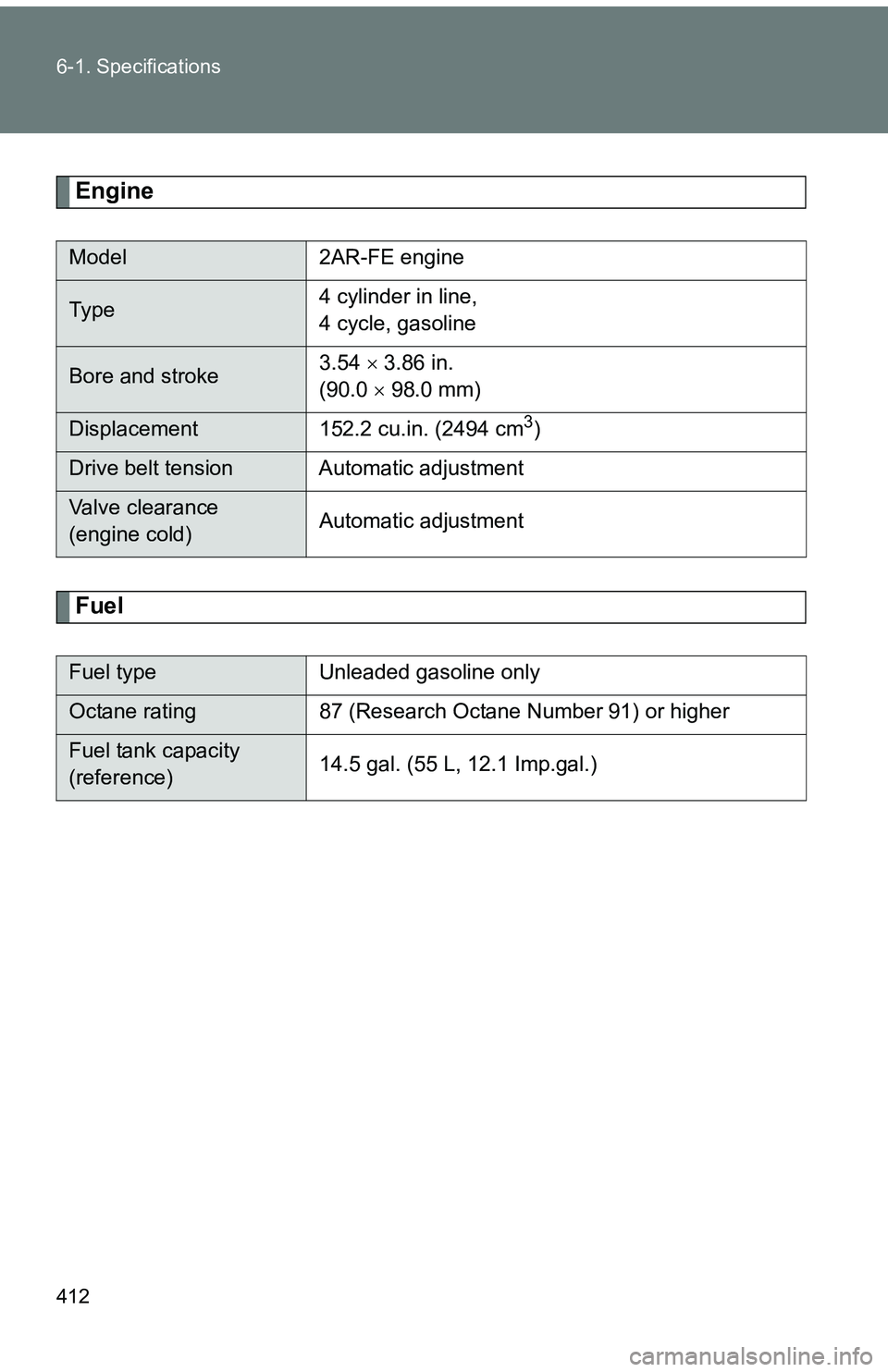
412 6-1. Specifications
Engine
Fuel
Model2AR-FE engine
Ty pe 4 cylinder in line,
4 cycle, gasoline
Bore and stroke3.54
3.86 in.
(90.0 98.0 mm)
Displacement 152.2 cu.in. (2494 cm3)
Drive belt tension Automatic adjustment
Valve clearance
(engine cold) Automatic adjustment
Fuel type
Unleaded gasoline only
Octane rating 87 (Research Octane Number 91) or higher
Fuel tank capacity
(reference) 14.5 gal. (55 L, 12.1 Imp.gal.)
Page 423 of 473
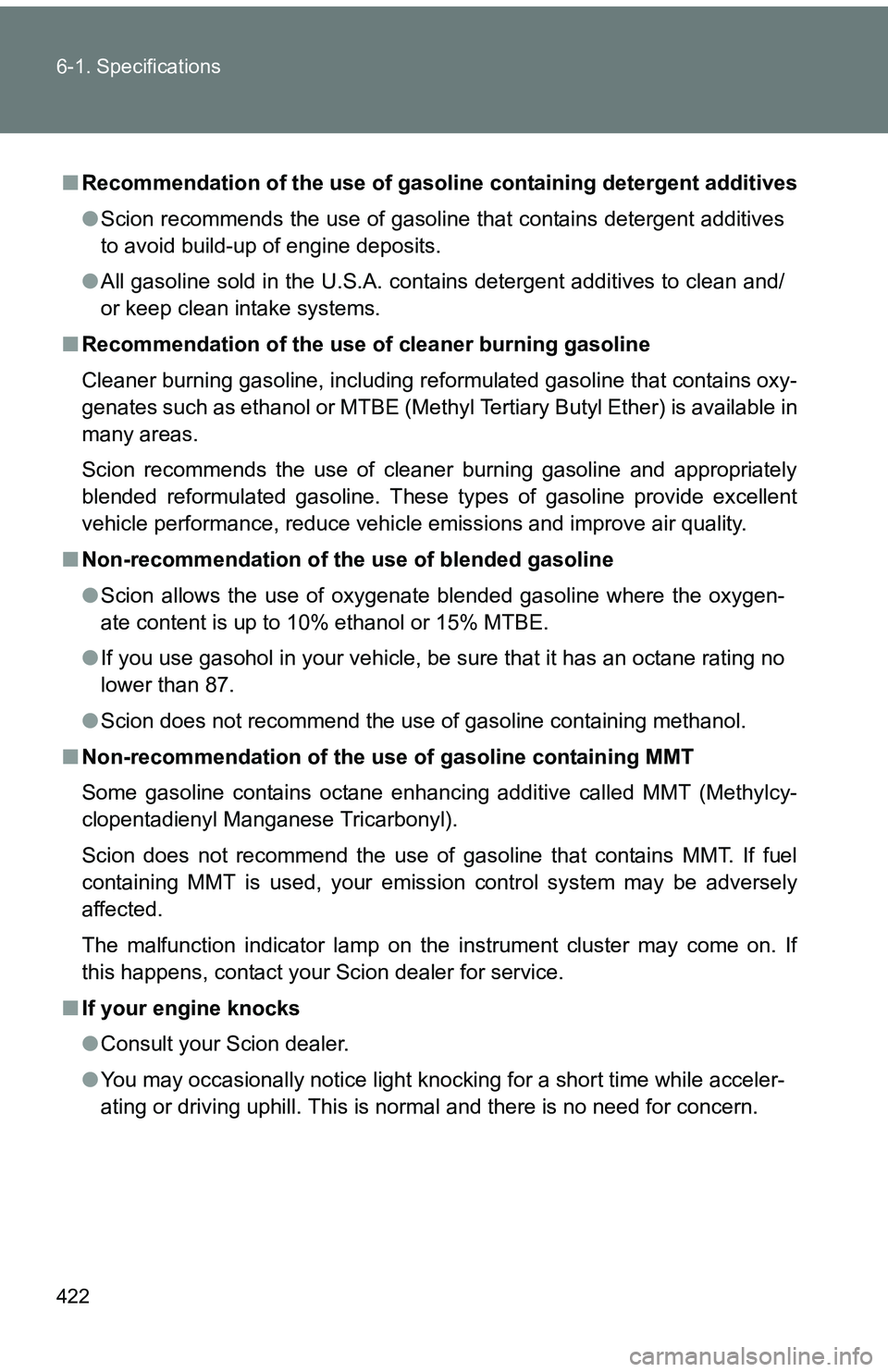
422 6-1. Specifications
■Recommendation of the use of gaso line containing detergent additives
● Scion recommends the use of gasoline that contains detergent additives
to avoid build-up of engine deposits.
● All gasoline sold in the U.S.A. contains detergent additives to clean and/
or keep clean intake systems.
■ Recommendation of the use of cleaner burning gasoline
Cleaner burning gasoline, including reformulated gasoline that contains oxy-
genates such as ethanol or MTBE (Methyl Tertiary Butyl Ether) is available in
many areas.
Scion recommends the use of cleaner burning gasoline and appropriately
blended reformulated gasoline. These types of gasoline provide excellent
vehicle performance, reduce vehicle emissions and improve air quality.
■ Non-recommendation of the use of blended gasoline
●Scion allows the use of oxygenate blended gasoline where the oxygen-
ate content is up to 10% ethanol or 15% MTBE.
● If you use gasohol in your vehicle, be sure that it has an octane rating no
lower than 87.
● Scion does not recommend the use of gasoline containing methanol.
■ Non-recommendation of the use of gasoline containing MMT
Some gasoline contains octane enhancing additive called MMT (Methylcy-
clopentadienyl Manganese Tricarbonyl).
Scion does not recommend the use of gasoline that contains MMT. If fuel
containing MMT is used, your emission control system may be adversely
affected.
The malfunction indicator lamp on the instrument cluster may come on. If
this happens, contact your Scion dealer for service.
■ If your engine knocks
●Consult your Scion dealer.
● You may occasionally notice light knocking for a short time while acceler-
ating or driving uphill. This is normal and there is no need for concern.
Page 424 of 473
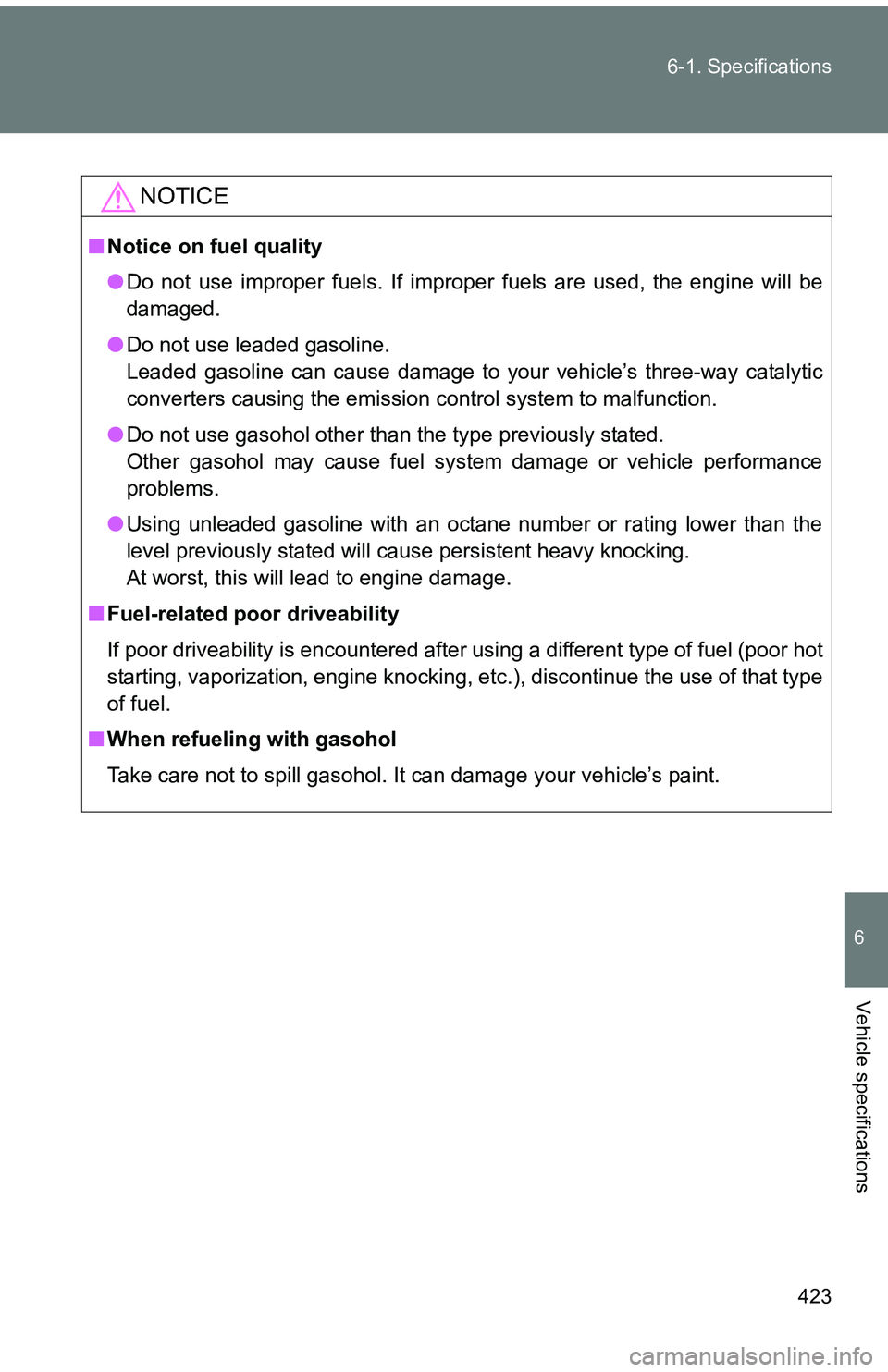
423
6-1. Specifications
6
Vehicle specifications
NOTICE
■
Notice on fuel quality
●Do not use improper fuels. If improper fuels are used, the engine will be
damaged.
● Do not use leaded gasoline.
Leaded gasoline can cause damage to your vehicle’s three-way catalytic
converters causing the emission control system to malfunction.
● Do not use gasohol other than the type previously stated.
Other gasohol may cause fuel system damage or vehicle performance
problems.
● Using unleaded gasoline with an octane number or rating lower than the
level previously stated will cause persistent heavy knocking.
At worst, this will lead to engine damage.
■ Fuel-related poor driveability
If poor driveability is encountered after using a different type of fuel (poor hot
starting, vaporization, engine knocking, etc.), discontinue the use of that type
of fuel.
■ When refueling with gasohol
Take care not to spill gasohol. It can damage your vehicle’s paint.
Page 462 of 473
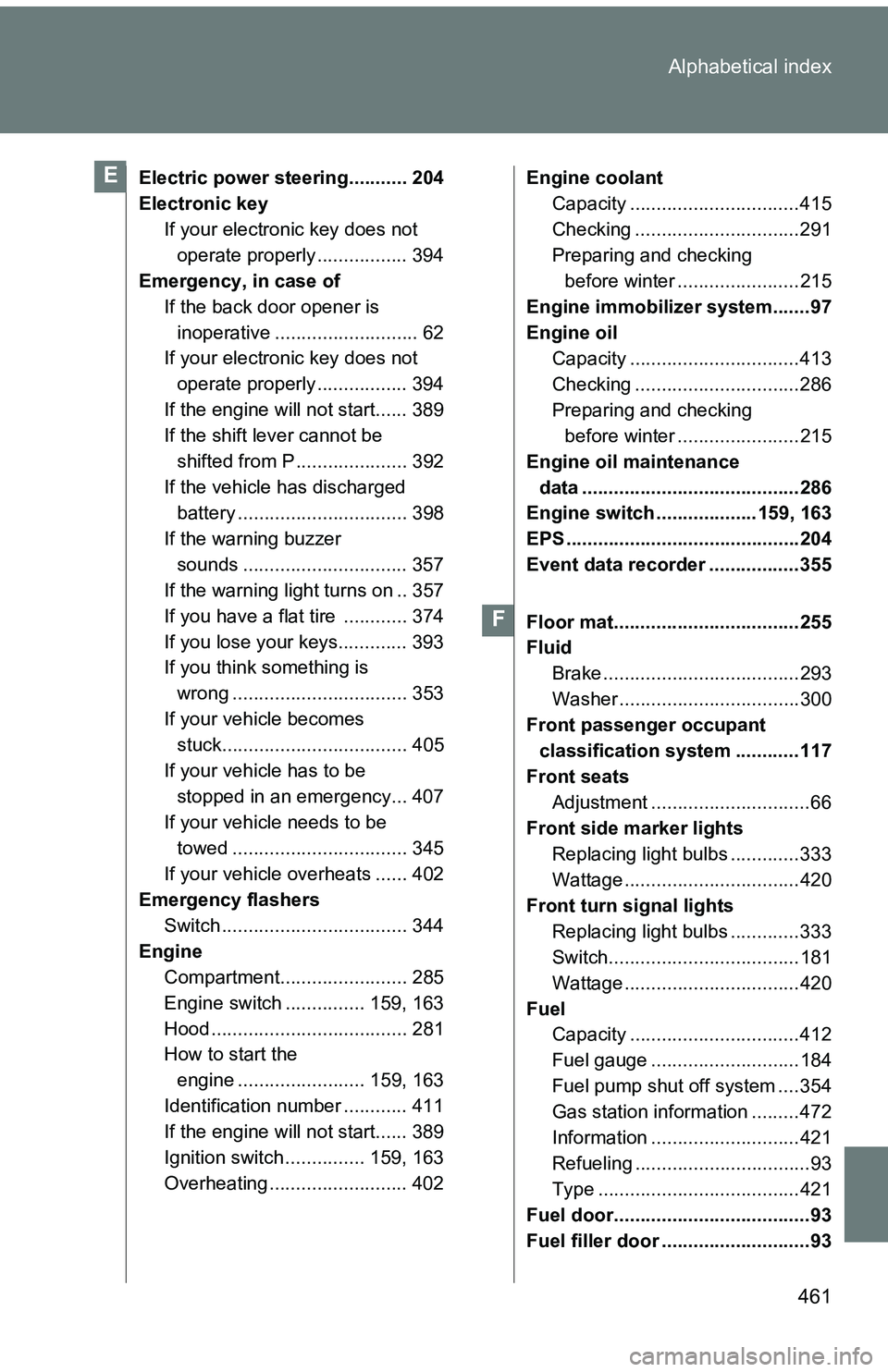
461
Alphabetical index
Electric power steering........... 204
Electronic key
If your electronic key does not operate properly ................. 394
Emergency, in case of
If the back door opener is inoperative ........................... 62
If your electronic key does not
operate properly ................. 394
If the engine will not start...... 389
If the shift lever cannot be shifted from P ..................... 392
If the vehicle has discharged battery ................................ 398
If the warning buzzer sounds ............................... 357
If the warning light turns on .. 357
If you have a flat tire ............ 374
If you lose your keys............. 393
If you think something is
wrong ................................. 353
If your vehicle becomes stuck................................... 405
If your vehicle has to be stopped in an emergency... 407
If your vehicle needs to be
towed ................................. 345
If your vehicle overheats ...... 402
Emergency flashers
Switch ................................... 344
Engine Compartment........................ 285
Engine switch ............... 159, 163
Hood ..................................... 281
How to start the
engine ........................ 159, 163
Identification number ............ 411
If the engine will not start...... 389
Ignition switch ............... 159, 163
Overheating .......................... 402 Engine coolant
Capacity ................................415
Checking ...............................291
Preparing and checking before winter .......................215
Engine immobilizer system.......97
Engine oil Capacity ................................413
Checking ...............................286
Preparing and checking before winter .......................215
Engine oil maintenance data .........................................286
Engine switch ...................159, 163
EPS ............................................204
Event data recorder .................355
Floor mat...................................255
Fluid
Brake .....................................293
Washer ..................................300
Front passenger occupant
classification system ............117
Front seats Adjustment ..............................66
Front side marker lights Replacing light bulbs .............333
Wattage .................................420
Front turn signal lights Replacing light bulbs .............333
Switch....................................181
Wattage .................................420
Fuel Capacity ................................412
Fuel gauge ............................184
Fuel pump shut off system ....354
Gas station information .........472
Information ............................421
Refueling .................................93
Type ......................................421
Fuel door.....................................93
Fuel filler door ............................93E
F
Page 473 of 473
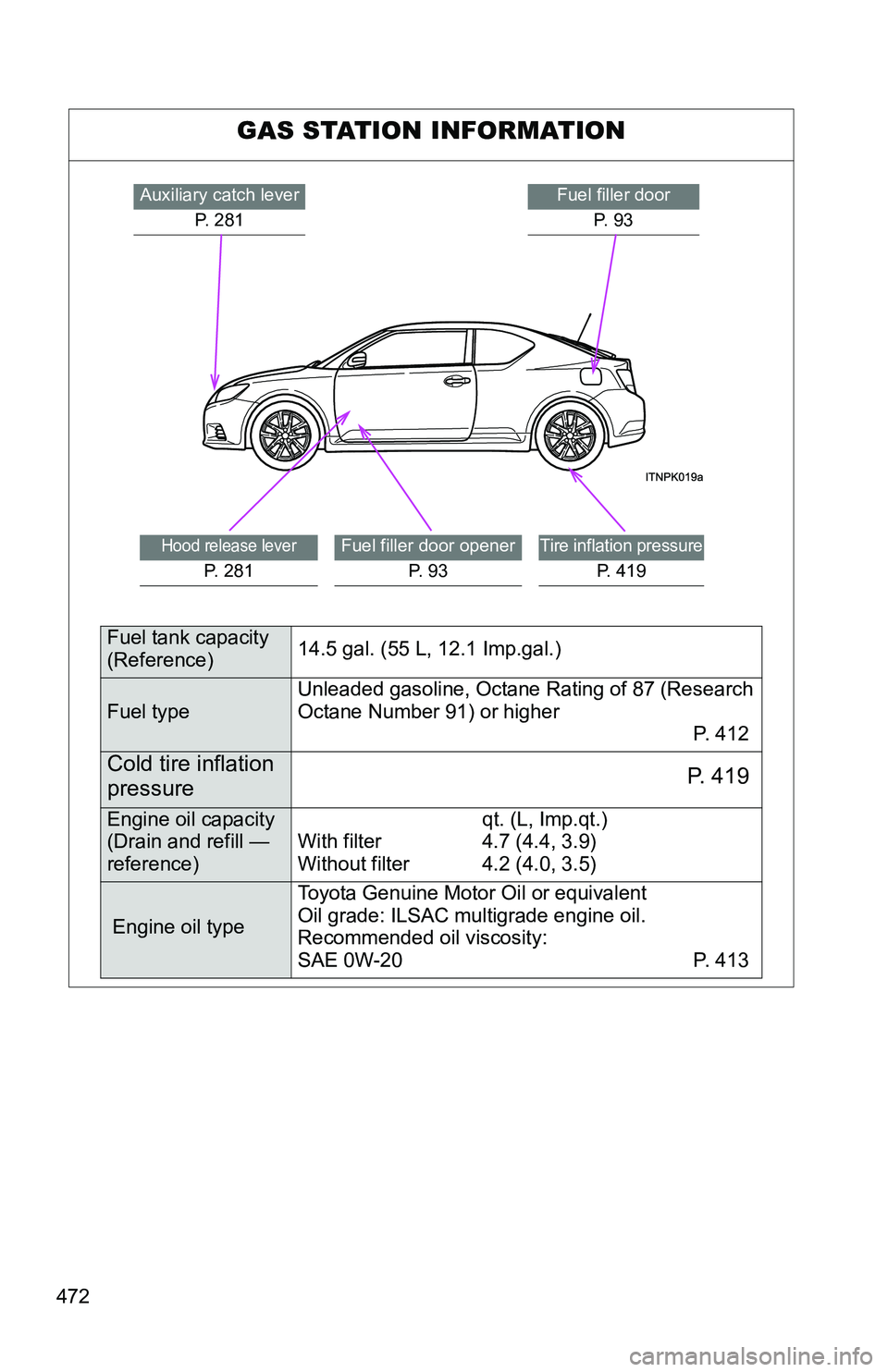
472
GAS STATION INFORMATION
Auxiliary catch leverP. 281Fuel filler doorP. 9 3
Hood release lever
P. 2 8 1
Fuel filler door opener P. 9 3Tire inflation pressure
P. 419
Fuel tank capacity
(Reference) 14.5 gal. (55 L,
12.1 Imp.gal.)
Fuel type Unleaded gasoline, Octane Rating of 87 (Research
Octane Number 91) or higher
P. 4 1 2
Cold tire inflation
pressure P. 419
Engine oil capacity
(Drain and refill —
reference)qt. (L, Imp.qt.)
With filter 4.7 (4.4, 3.9)
Without filter 4.2 (4.0, 3.5)
Engine oil type Toyota Genuine Motor Oil or equivalent
Oil grade: ILSAC multigrade engine oil.
Recommended oil viscosity:
SAE 0W-20 P. 413